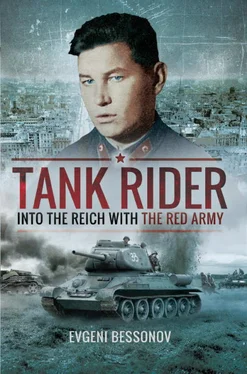After I was wounded, tanks arrived to assist the companies. Just three T-34-85 tanks arrived, but they increased the morale of the soldiers. Already then, in mid-1944, the tank crews were afraid of Panzerfausts and we tank riders would sit at the front of the tanks when in forests. In such cases tanks were ordered to fire just armourpiercing shells at enemy tanks, not high-explosive shells. Everything seemed to be clear and tank crews were supposed to know that order and stick to it, but as the saying goes, every family has its black sheep. One of the tanks fired only one shell, it hit a tree and cut down all who stood next to it. Senior Sergeant Safronov, medic of our company, veteran of the battalion, was killed. He was 43 or 45 years old, we all respected him, he was a cheerful and brave ‘uncle’, he always provided first medical aid to wounded soldiers and was highly respected in the company. I enjoyed good friendly relations with him; when there were no soldiers around, he rarely addressed me with full military rank, but called me by name. Why did he have to be in the attacking line? Apparently, he wanted to provide medical aid directly on the battlefield.
As they told me later, both companies went through the forest and dug in in the field in front of the forest, among abandoned village houses. It was a good place to set a defence. The Fritzes – both infantry and tanks – disappeared out of sight and did not disturb the company, and our tanks also left.
A heavy thunderstorm started in the afternoon of the next day, and rain poured down. The company posted observers and soldiers hid in their shallow trenches, covered with rain capes. The night was pitch dark, nothing could be seen even at short distances. It was on that night that the Germans quietly attacked the battalion. It was quite untypical of the Germans, they rarely attacked at night, especially in such bad weather. Apparently, the battalion position was also important for the Fritzes. In flashes of lightning our observers spotted the Germans and opened fire, but it was too late, the Germans were already among the trenches and they rushed into the battalion defences. The soldiers could not put up proper resistance – they jumped out of the trenches and ran back towards the rear, but the Germans ran together with them. All the soldiers were mixed up, you could only see who was who in the lightning. The battalion’s soldiers (two companies, 20 to 30 men each), reached the initial lines in their ‘cross country race’ and stopped there. The Germans did not advance further, digging in almost at the forest edge. With the end of the thunderstorm and dawn, our company put itself in order and counted losses. We did have losses, but they were amazingly low.
An order to recapture the positions that we fled from came from the Brigade’s commander. A Katyusha battery (four vehicles) arrived to support the battalion. Soldiers had a chance to dry themselves after a horrible rain shower and prepare for an offensive during the day. The battalion commander ordered everyone from the battalion’s support units into the attacking line. As he said: ‘Send everyone, except for Bessonov.’ Junior Lieutenant Burkov, deputy battalion commander arrived to see that the order was fulfilled. Those support unit men that did not have weapons received them and some 25 or 30 of them were sent to the battalion companies.
I had a chance to see the Katyusha rocket launchers, their equipment for launching and aiming. As I have written before, they did not aim very accurately, twice I saw them hitting friendly troops, not the enemy. One time, at Dobropolie village, they hit positions of my platoon. It was a horrible weapon. If I am not mistaken, each vehicle (rocket launcher) carried 16 rockets (1.8 metres long), that made 64 rockets per battery, and they were all fired in one instance. The sound of their launch was quite loud.
In the afternoon Katyushas fired on the Germans; after the completion of the salvo the battalion launched the attack and quickly captured the trenches that it had had to abandon in the evening, during the thunderstorm. As some participants of the assault told me, the Katyusha salvo destroyed almost all the Germans. There was no resistance from the German side – there was simply no one left to fight. The positions were regained. That was it.
After several days the Germans calmed down, stopped their attacks and went on the defensive. In mid-September (15 to 17) we handed over our sector to a general army unit. We were transferred to the second echelon of the first Ukrainian front for replenishments in personnel, military hardware and equipment. During the operation that had lasted around two months, we had travelled 600 kilometres, in many cases we had to fight our way through. We liberated many settlements, including the cities of Lvov, Bobrka, Zolochev, Peremyshlyany and others. Our 6th Guards Mechanized Corps was awarded for the Lvov-Sandomir operation, mostly for liberation of Lvov – the Corps received an honorary title of ‘Lvov’, while our 49th Mechanized Brigade was awarded with the Order of Bogdan Khmelnitski. The Lvov-Sandomir operation was over for us.
PREPARATIONS FOR THE PUSH WEST

The battalion, or rather what little remained of it, was lodged in huts in Vengertse Panenske village, which had been abandoned by locals. We buried platoon leader Lieutenant Savin and a private, who had been killed at the Sandomir bridgehead, at the edge of the village. The craftsmen of the battalion made monuments for their graves. We took full advantage of the lull and got our hair cut by the company’s handy-men, washed in the field banya (which in summer, and in winter, was nothing more than a tarpaulin tent), changed our underwear, ‘fried’ our uniforms in barrels and wrote letters home. While we were settling down, Lieutenants Petr Shakulo and Alexander Guschenkov came back from hospital, while Senior Lieutenant Grigori Vyunov arrived to replace wounded Gavrilov, who was still in hospital. As far as I remember, he was a political officer and had never led a combat unit before. We were not too curious, and he also tried to avoid the question as to why they sent him to us. The main thing was that he was a good comrade, a calm and cheerful person with a gentle character. He was around 30, and he was a bit too stout for a platoon leader, though of course he grew thinner later on. A new medic, a Sergeant, also arrived in the company. I do not remember his last name, and I probably never knew it, as everyone called him ‘Brotherly Heart’ – because of the way he began conversations with many men. He was around 40, or maybe a bit older. A cheerful and cordial person, he quickly became part of our team.
The company’s personnel lived in huts, most of us slept on plank beds, on hay covered with rain capes. Most importantly, we had a roof over our heads and a stove; although it was a bit crowded, it was not a problem. Company commander Chernyshov lived separately from us, while we all lived together; the company’s Sergeant Major Bratchenko also stayed with us. We slept on beds, two people on one bed, but sometimes just on hay. It was warm in the house, and as a rule we could take off our uniforms for the night. During the day we trained the personnel, and entertained ourselves in the evenings in different ways. We had a lamp made of an empty 45 mm shell – we burnt petrol with salt in it. Sometimes we would play cards, write letters, or go for a visit to the neighbouring company. We would often have conversations with the soldiers of the platoon. We would normally talk about ourselves, our relatives, sometimes soldiers had some requests or recommendations. If the company’s Sergeant Major could do something (he was the main administrator in the company), we informed him about the soldiers’ requests. Bratchenko really did not like to hear comments about his work, but he corrected his failures quickly. The soldiers liked these discussions, they felt that they were taken care of and knew that I was on their side.
Читать дальше














